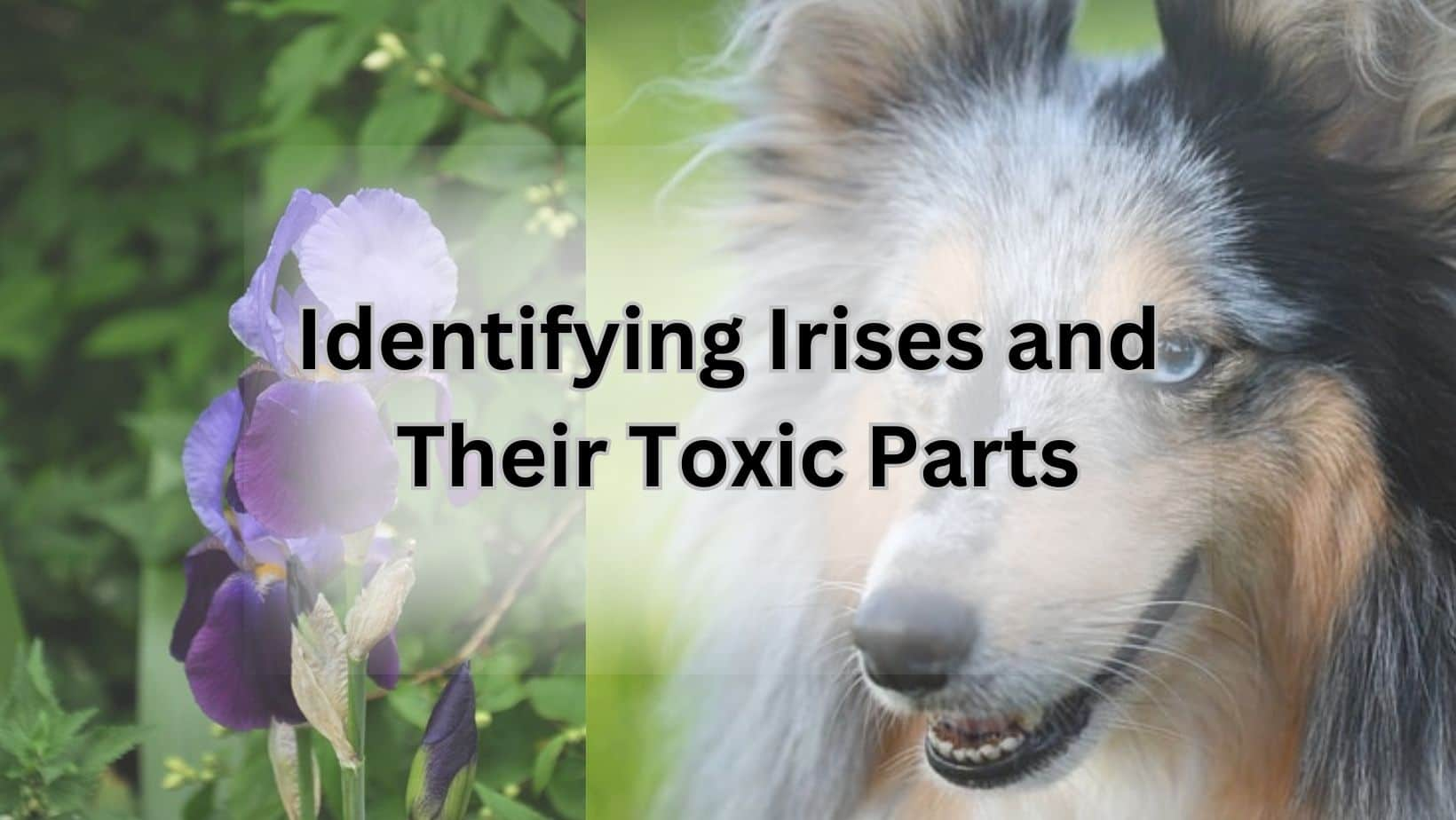Are Irises Toxic to Dogs? The Surprising Truth Revealed!

Overview of Irises and Dogs
Are irises poisonous to dogs? The answer is yes, irises can be toxic to our furry friends. While these beautiful flowers may add color and charm to our gardens, they can pose a danger to dogs if ingested.
Introduction to Irises
Irises are popular ornamental plants known for their vibrant blooms and distinctive sword-shaped leaves. These flowers come in a variety of colors, making them a favorite choice for many gardeners. However, what many people may not realize is that certain species of irises contain toxins that can be harmful to dogs if consumed.
Dogs and Plant Toxicity
Did you know that dogs are curious creatures who love to explore their surroundings, including your garden? This natural curiosity can sometimes lead them to nibble on plants, including potentially toxic ones like irises. As responsible pet owners, it’s essential to be aware of the plants in our environment that could be harmful to our furry friends.
Potential Risks for Dogs
Imagine your dog frolicking in the garden, only to discover that they’ve taken a bite out of an iris plant. What are the potential risks of iris poisoning for dogs? Symptoms of iris toxicity in dogs can include vomiting, diarrhea, drooling, lethargy, and even more severe reactions in some cases. It’s crucial to act quickly if you suspect your dog has ingested any part of an iris plant.
Identifying Irises and Their Toxic Parts
Types of Irises
Have you ever stopped to admire the beauty of irises in your garden? These stunning flowers come in various colors, from deep purples to vibrant yellows, and are a favorite among many garden enthusiasts.
But did you know that not all irises are safe for your furry friends? Some common types of irises, such as the Bearded Iris and the Siberian Iris, contain toxins that can be harmful to dogs if ingested.
Toxic Components in Irises
Ever wondered what makes irises potentially dangerous for your canine companions? The toxic components in irises that pose a risk to dogs include iridin, a substance found in the rhizomes of the plant.
This compound can cause gastrointestinal upset, drooling, vomiting, and diarrhea in dogs if they come into contact with it. It’s essential to keep a close eye on your pets when they are around irises to prevent any accidental ingestion.
Symptoms of Poisoning in Dogs
Curious about how to tell if your dog has been poisoned by irises? Keep an eye out for symptoms such as vomiting, diarrhea, drooling, lethargy, and in severe cases, difficulty breathing.
If you suspect that your dog has ingested irises, it’s crucial to seek immediate veterinary attention to prevent any further complications. Remember, early detection and treatment are key to ensuring your furry friend’s well-being.
While irises may add a pop of color to your garden, it’s essential to be aware of the potential risks they pose to your four-legged companions. By familiarizing yourself with the types of irises, toxic components, and symptoms of poisoning in dogs, you can take proactive steps to keep your pets safe and happy.
So, next time you’re out in the garden, make sure to keep a watchful eye on your furry friends and opt for dog-friendly alternatives to irises to create a safe and beautiful outdoor space for everyone to enjoy.
Effects of Iris Poisoning on Dogs
Health Impact on Dogs
Have you ever wondered what happens to your furry friend if they come into contact with poisonous irises? Well, let me tell you – it’s not a pretty sight! The toxicity of irises can wreak havoc on your dog’s health, causing symptoms such as vomiting, diarrhea, drooling, and even difficulty breathing. It’s a scary situation that no pet owner wants to deal with.
Treatment for Iris Poisoning
Now, let’s talk about how we can help our canine companions if they do happen to ingest irises. The first step is to contact your veterinarian immediately. They will be able to provide the necessary treatment, which may include inducing vomiting, administering activated charcoal, or even hospitalization in severe cases. It’s crucial to act fast to ensure the best possible outcome for your furry friend.
Long-term Consequences for Dogs
So, what are the long-term consequences of iris poisoning for dogs? Well, it really depends on the severity of the poisoning and how quickly treatment is administered. In mild cases, your dog may recover fully with no lasting effects. However, in more severe cases, there could be long-term damage to their internal organs, which may impact their overall health and well-being. That’s why it’s so important to keep our dogs safe from harmful plants like irises.
So remember, t’s essential to be aware of the potential dangers that irises can pose to our beloved canine companions. By taking the necessary precautions and keeping our furry friends away from toxic plants, we can ensure that they stay happy and healthy for years to come. Remember, prevention is always better than cure when it comes to our pets’ well-being!
Preventing Iris Poisoning in Dogs
Keeping Irises Away from Dogs
Are you worried about your furry friend getting into trouble with toxic plants like irises? Well, fear not, because there are simple steps you can take to keep them safe. When it comes to irises, the best defense is a good offense. Make sure to plant them in areas that are inaccessible to your dog.
Whether that means using raised beds, fencing off certain sections of your garden, or simply keeping your pup on a leash when they’re outside, prevention is key.
Training Dogs to Avoid Irises
Have you ever tried teaching your dog to stay away from certain areas or objects? It can be a challenge, but with patience and consistency, it’s definitely possible. When it comes to irises, you can use positive reinforcement to train your dog to avoid them. Reward them with treats or praise when they steer clear of the plants, and redirect their attention to something more appropriate if they start to show interest. Remember, consistency is key when it comes to training your pup.
Safe Alternatives for Dog-Friendly Gardens
Looking for dog-friendly alternatives to irises that will still make your garden look beautiful? You’re in luck! There are plenty of safe plants that you can incorporate into your landscaping without putting your furry friend at risk.
Consider options like marigolds, petunias, or snapdragons, which are all safe for dogs. Not only will these plants add color and vibrancy to your garden, but they’ll also give you peace of mind knowing that your dog is safe from harm.
By following these simple tips, you can create a beautiful garden that is safe for your canine companion. Remember, prevention is always better than cure when it comes to keeping your dog safe from toxic plants like irises.
So, take the necessary precautions, train your dog to avoid dangerous areas, and choose safe alternatives for a dog-friendly garden that both you and your furry friend can enjoy.
What to Do If Your Dog Ingests Irises

Immediate Steps to Take
Ever wondered what you should do if your furry friend decides to snack on some irises in the garden? Well, let me shed some light on that for you! The first thing you need to do is stay calm (easier said than done, I know). Next, try to determine how much of the plant your dog has ingested. Are they just nibbling on a few petals, or did they go all out and devour the whole thing like it’s a gourmet meal?
Contacting a Veterinarian
So, you’ve realized that your dog has turned into a little botanist and sampled some irises. What’s the next step? It’s time to pick up that phone and call your vet! They are the real MVPs in situations like these. Describe the situation in detail and follow their advice to the letter. Trust me; they know what they’re doing.
Monitoring Your Dog’s Condition
Now that you’ve taken the necessary steps, it’s time to play the waiting game (cue the dramatic music). Keep a close eye on your dog for any unusual symptoms like vomiting, diarrhea, or lethargy. If you notice anything out of the ordinary, don’t hesitate to reach out to your vet again. Remember, it’s always better to be safe than sorry when it comes to your four-legged pal’s health.
In a nutshell, if your dog decides to have a taste of those pretty irises in your garden, don’t panic! Stay calm, call your vet, and keep a watchful eye on your furry companion. With the right actions and a bit of luck, your dog will be back to their mischievous self in no time. Just remember, next time, maybe opt for some dog-friendly plants to avoid any more floral snacking escapades!
Common Misconceptions about Irises and Dogs
Beliefs about Irises
Do you ever wonder if those beautiful irises in your garden could be harmful to your furry friend? Well, let’s clear up some misconceptions about irises and dogs. Many people believe that irises are completely safe for dogs, but the truth is that certain parts of the plant can be toxic if ingested. It’s important to be aware of this potential danger and take precautions to keep your pup safe.
Dog’s Immunity to Certain Plants
Have you ever heard the myth that dogs are immune to the harmful effects of plants like irises? While it’s true that some dogs may have a higher tolerance for certain toxins, it doesn’t mean they are completely immune. Dogs can still suffer from poisoning if they ingest toxic plants like irises. It’s crucial to remember that prevention is key when it comes to keeping your dog safe from potentially harmful plants in your garden.
Importance of Awareness and Education
Do you know all the common plants that are harmful to dogs? Being aware of which plants can be toxic to your furry friend is the first step in keeping them safe. Educating yourself about the symptoms of poisoning and knowing what to do in case of an emergency can make all the difference. By staying informed and taking proactive measures, you can create a dog-friendly garden that is both beautiful and safe for your beloved pet.
Remember, when it comes to your dog’s health and safety, it’s always better to be safe than sorry. By debunking common misconceptions about irises and dogs, you can ensure that your furry friend stays happy and healthy in your garden. Stay informed, stay vigilant, and enjoy the beauty of your garden without worrying about potential dangers lurking in the petals of those gorgeous irises.
Risks of Allowing Dogs Near Irises

Dangers of Unsupervised Dogs
Have you ever wondered what mischief your furry friend could get up to when left unsupervised in the garden? Well, when it comes to irises, the risks are real. These beautiful flowers may seem harmless, but to a curious dog, they could spell trouble.
Impact on Dog’s Health
Did you know that irises can be toxic to dogs if ingested? It’s true! The lovely blooms that brighten up your garden can have serious consequences for your canine companion. From stomach upset to more severe symptoms, such as vomiting and diarrhea, the impact on your dog’s health can be significant.
Legal Implications for Pet Owners
Ever considered the legal implications of allowing your dog near poisonous plants like irises? As a responsible pet owner, it’s essential to be aware of the potential risks.
In some cases, if your dog were to ingest toxic plants and suffer harm, you could be held liable. It’s not just about keeping your furry friend safe; it’s also about protecting yourself from legal trouble.
When it comes to irises and your beloved dog, it’s crucial to be proactive in ensuring their safety. By understanding the risks of allowing your dog near these toxic plants, you can take steps to prevent any unfortunate incidents. Remember, a little caution can go a long way in keeping your furry friend happy and healthy!
Safe Gardening Practices for Dog Owners
Pet-Friendly Plants
Are you a proud dog owner looking to create a beautiful garden that is safe for your furry friend to roam around in? Well, look no further! Let me guide you on selecting pet-friendly plants that will not pose any harm to your beloved canine companion. When it comes to choosing plants for your garden, opt for non-toxic varieties such as marigolds, sunflowers, and petunias. These colorful blooms will not only brighten up your garden but also keep your dog safe from any potential hazards.
Secure Garden Fencing
Do you often find yourself worrying about your adventurous pup wandering off into the neighbor’s garden or getting into mischief? Fear not! A sturdy garden fence is your best friend when it comes to keeping your dog safe and secure in your outdoor space. Invest in a reliable fence that is tall enough to prevent your dog from jumping over and escaping. This way, you can enjoy peace of mind knowing that your furry friend is happily exploring the garden without any risks.
Regular Monitoring of Garden Spaces
Have you ever wondered what your dog gets up to when you’re not looking? Dogs are curious creatures and can often get themselves into sticky situations when left unsupervised in the garden. To prevent any accidents or mishaps, make sure to regularly monitor your garden spaces for any potential hazards. Keep an eye out for toxic plants like irises, which can be harmful to your dog if ingested. By staying vigilant and proactive, you can create a safe and enjoyable environment for your dog to frolic in.
Creating a dog-friendly garden is all about being mindful of the plants you choose, securing your outdoor space, and keeping a watchful eye on your furry companion.
You can ensure that your dog stays safe and happy while exploring the great outdoors. So go ahead, roll up your sleeves, and get ready to create a garden that both you and your dog will love!
Seeking Professional Advice on Pet Safety
Consulting with a Veterinarian
Are you worried about your furry friend’s safety around potentially toxic plants like irises? Well, fret not! Your local veterinarian is your best friend in times like these. They can provide you with valuable insights on how to keep your dog safe from harmful flora. Remember, prevention is always better than cure when it comes to your pet’s well-being.
Garden Experts’ Recommendations
Ever wondered how you can create a beautiful garden that is also safe for your canine companion? Garden experts are here to save the day! They can suggest safe alternatives to irises that will still make your garden bloom with beauty without posing a threat to your furry friend.
So, next time you’re planning your garden or worried about your dog’s safety, don’t hesitate to reach out to these professionals. They have the knowledge and expertise to guide you in creating a safe environment for your beloved pet. Remember, a little precaution goes a long way when it comes to keeping your furry friend happy and healthy!
Conclusion and Summary
As a Canid Wild Life Lover with two decades of experience, I can confidently say that the toxicity of irises to dogs is a serious concern that all pet owners should be aware of. It is crucial to understand the potential dangers that certain plants, like irises, can pose to our furry friends and take necessary precautions to keep them safe.
Recap of Iris Toxicity
Did you know that irises are indeed poisonous to dogs? These beautiful flowers contain compounds that can be harmful if ingested by our canine companions. Symptoms of iris poisoning in dogs include vomiting, diarrhea, drooling, and abdominal pain. It is essential to seek veterinary care immediately if you suspect your dog has consumed any part of an iris plant.
Importance of Responsible Pet Ownership
How can we ensure the safety of our dogs around toxic plants like irises? Responsible pet ownership plays a significant role. By educating ourselves about harmful plants, creating dog-friendly gardens with safe alternatives, and supervising our pets while outdoors, we can prevent accidental ingestion and keep our furry friends out of harm’s way.
Promoting Safe Environments for Dogs
What are some common plants that are harmful to dogs, besides irises? It’s essential to be aware of toxic plants such as lilies, azaleas, and daffodils, which can also pose a threat to our canine companions.
Protecting our dogs from poisonous plants like irises requires vigilance, knowledge, and a commitment to their well-being.
By implementing pet-safe gardening practices, staying informed about potential hazards, and acting promptly in case of an emergency, we can ensure that our furry friends lead happy and healthy lives. Remember, a little effort goes a long way in keeping our dogs safe and secure.

